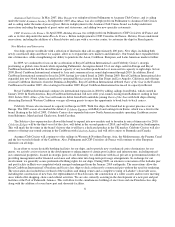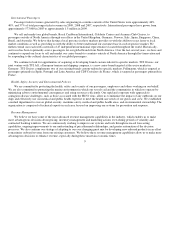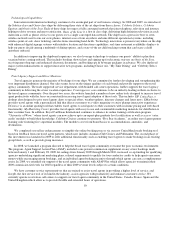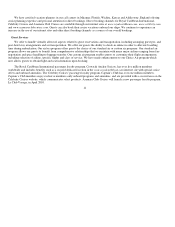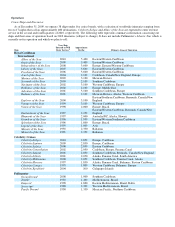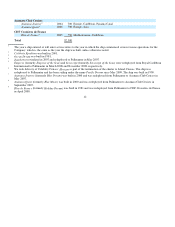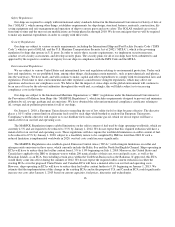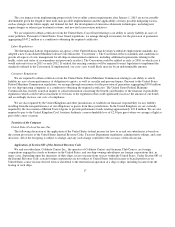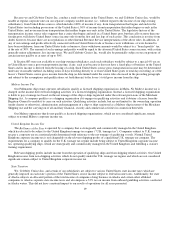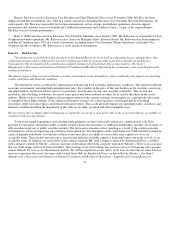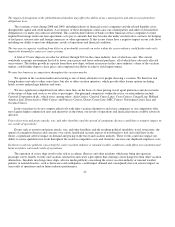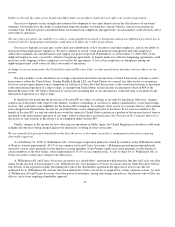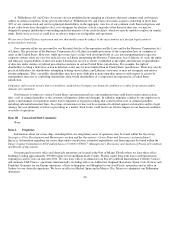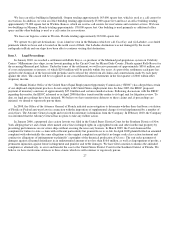Royal Caribbean Cruise Lines 2009 Annual Report Download - page 27
Download and view the complete annual report
Please find page 27 of the 2009 Royal Caribbean Cruise Lines annual report below. You can navigate through the pages in the report by either clicking on the pages listed below, or by using the keyword search tool below to find specific information within the annual report.
The cost impacts from implementing progressively lower sulfur content requirements after January 1, 2015 are not reasonably
determinable given the length of time until such possible implementation and the applicability of many possible mitigating factors,
such as changes in the future supply and demand for fuel, the development of emissions abatement technologies, including new
engine designs or exhaust gas treatment systems, and new fuel conservation initiatives.
We are required to obtain certificates from the United States Coast Guard relating to our ability to satisfy liability in cases of
water pollution. Pursuant to United States Coast Guard regulations, we arrange through our insurers for the provision of guarantees
aggregating $347.2 million as a condition to obtaining the required certificates.
Labor Regulations
The International Labour Organization, an agency of the United Nations that develops worldwide employment standards, has
adopted a new Consolidated Maritime Labour Convention (the “Convention”). The Convention reflects standards and conditions to
govern all aspects of crew management for all ships in international commerce, including additional requirements relating to the
health, safety and status of crewmembers not previously in effect. The Convention could be ratified as early as 2010, in which case it
would enter into force in 2011 or early 2012. If ratified, the enacting countries will be required to enact legislation to implement the
standards outlined in the Convention. If implemented, our crew costs would likely increase by an indeterminable amount.
Consumer Regulations
We are required to obtain certificates from the United States Federal Maritime Commission relating to our ability to satisfy
liability in cases of non-performance of obligations to guests, as well as casualty and personal injury. Pursuant to the United States
Federal Maritime Commission regulations, we arrange through our insurers for the provision of guarantees aggregating $30.0 million
for our ship-operating companies as a condition to obtaining the required certificates. The United States Federal Maritime
Commission has recently issued an inquiry to solicit information concerning the benefits and burdens of the financial responsibility
regulations which could result in enactment of revisions to the regulations that could significantly increase the amount of our bonds
and accordingly increase our costs of compliance.
We are also required by the United Kingdom and other jurisdictions to establish our financial responsibility for any liability
resulting from the non-performance of our obligations to guests from these jurisdictions. In the United Kingdom, we are currently
required by the Association of British Travel Agents to provide performance bonds totaling approximately £23.8 million. We are also
required to pay to the United Kingdom Civil Aviation Authority a non-refundable levy of £2.50 per guest where we arrange a flight as
part of the cruise vacation.
Taxation of the Company
United States Federal Income Tax
The following discussion of the application of the United States federal income tax laws to us and our subsidiaries is based on
the current provisions of the United States Internal Revenue Code, Treasury Department regulations, administrative rulings, and court
decisions. All of the foregoing is subject to change, and any such change could affect the accuracy of this discussion.
Application of Section 883 of the Internal Revenue Code
We and our subsidiary, Celebrity Cruises Inc., the operator of Celebrity Cruises and Azamara Club Cruises, are foreign
corporations engaged in a trade or business in the United States, and our ship-owning subsidiaries are foreign corporations that, in
many cases, depending upon the itineraries of their ships, receive income from sources within the United States. Under Section 883 of
the Internal Revenue Code, certain foreign corporations are not subject to United States federal income or branch profits tax on
United States source income derived from or incidental to the international operation of a ship or ships, including income from the
leasing of such ships.
17


